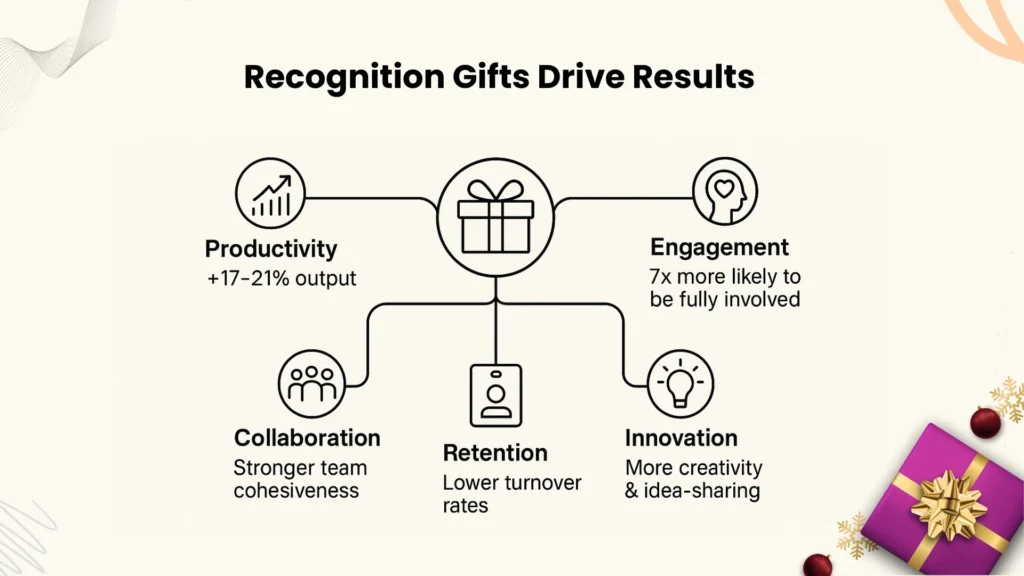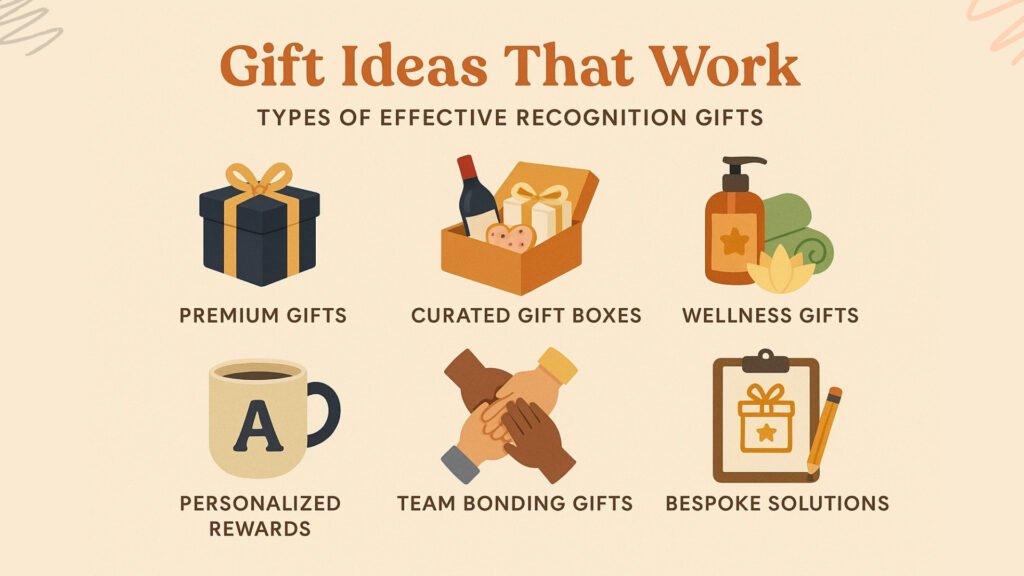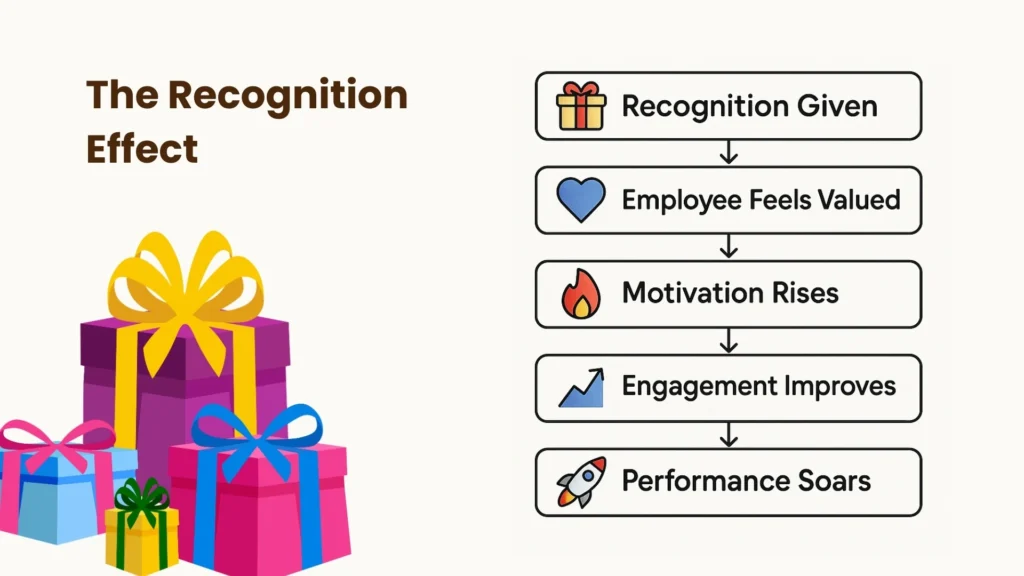Recognition gifts play a transformative role in boosting employee performance metrics, directly affecting motivation, morale, and productivity, while promoting a positive workplace culture. When carefully chosen and created with consideration of organizational objectives, these gifts could enhance key performance indicators and result in increased levels of engagement that ultimately translate into an increase in business performance.
This blog examines the overall effect of recognition gifts on employee performance metrics and expands on some of the least discussed yet vital areas including ROI, ethics, inclusivity, budgets, and cross-cultural considerations that can assist corporations in establishing sustainable recognition programs.
How Recognition Gifts Boost Employee Performance Metrics
Recognition gifts are not tokens; they are meaningful rewards that reward the efforts of employees and motivate them to grow further. As various research studies indicate, known employees are much more productive, engaged, and loyal. For example, employees who receive recognition are 2.5 times more likely to be happy at work and 1.5 times more likely to be motivated to perform their best. Furthermore, employee recognition programs can increase productivity by 11.1% to as much as 17%, with some research showing up to a 21% rise in productivity linked to effective recognition practices.

Employee performance improves because recognition gifts make individuals feel valued and inspire them to maintain or exceed standards. When corporate gifts are given to the employees in a thoughtful or personal way, their intrinsic motivation to perform better is enhanced. This can result in faster project actions, a better work line, more collaboration and even more creativity. Similarly, employee corporate gifts based on preference enhance emotional attachment to the company resulting in less absenteeism and turnover.
Types of Effective Recognition Gifts
The most effective recognition gifts cover a broad spectrum based on employee preferences and organizational culture. Popular formats include:

- Premium corporate gifts such as luxury items, tech gadgets, or high-quality branded products that signify status and appreciation.
- Corporate gift boxes that offer curated selections of multiple items, allowing employees to enjoy a variety of thoughtful treats.
- Wellness gifts targeting employee health and well-being, underscoring a company’s care beyond just professional performance.
- Meaningful rewards backed by personalization such as engraved items, custom gift sets, or experience vouchers that add emotional value.
- Team bonding gifts and group experiences that encourage collaboration and strengthen workplace relationships.
- Innovative corporate gifting companies often offer bespoke solutions that customize gifts based on regional, cultural, or industry-specific trends.
These diverse options ensure the program can cater to different personality types and milestones, making the recognition more inclusive and impactful.
Integration of Recognition into Employee Engagement and Satisfaction
Recognition gifts are a powerful contributor to employee engagement, which is an essential metric associated with productivity and retention. Companies that have an active recognition program have a much more engaged and satisfied workforce. Being recognized helps employees feel acknowledged and valued, which in turn can directly enhance the quality of work and motivation.
It is important to recognize success not only once or twice a year, but also to merge peer-to-peer recognition with manager-to-employee recognition and make it more effective. Workers who feel encouraged in a variety of corporate gift concepts demonstrate greater loyalty to their teams and organization goals. This behavior also helps in increasing employee satisfaction as it builds a recognition culture where both the small and big milestones are celebrated.
Measuring ROI and Business Impact
In order to maintain and expand recognition programmes, it is necessary to know the return on investment (ROI) of recognition gifts. The business rationale is the need to monitor the increase in performance measures including project completion, goal accomplishment, growth in sales, and retention rates in recognition groups.
A number of platforms can now help companies evaluate the direct effect of recognition on these KPIs. In the example, when recognition data is used in conjunction with performance software, it is shown that the recognized employees are more productive, collaborative, and innovative. This understanding can enable corporate gifting companies to customize their offerings in order to create the most effect and demonstrate to top management the economic worth of appreciative recognition.
Ethical and Inclusivity
Ethics and an inclusive approach needs to be the driving forces behind recognition programs. It is always important that gifts are reasonably shared and openly so that nobody feels like he is favored or sidelined. The culture of recognition should accommodate every employee and should not ignore diversity in tastes, cultural orientations, and work setups such as remote and hybrid workers.
Enhancing Performance with Thoughtful and Luxury Gifts
Recognition gifts are effective as far as thoughtfulness is concerned. Considerate presents which fit the interests, needs, or ambitions of an employee are way more effective than generic rewards. Status goods or non-random premium gifts indicate high value, but they have to be relevant to employee expectations to create motivation.
Properly designed recognition programs are aimed at generating memories and thankfulness rather than material value. Whether it is a luxury corporate gift or a simple meaningful token, the psychological effect of receiving appreciation translates to improved work ethic and attitude. This forms the basis of why most companies invest in meaningful rewards as one of the major elements of performance management.
Emerging Employee Gifting Trends Impacting Recognition
Digital gifting, gifts focused on sustainability and eco-friendliness, products that emphasize wellness, and gifts that are based on an experience rather than a gift card or merchandise have become trendy in 2025. Any of these trends evidences a more insightful interpretation of the employees preferences and changes in the society.
Firms that incorporate these trends into their corporate gifts for employees benefit from higher engagement and relevance. Wellness gifts, specifically, emphasize a comprehensive employee care strategy, which promotes not only productivity but health and total joy in general.
Employee Performance Metrics Directly Linked to Recognition Gifts
Recognition gifts positively influence critical employee performance metrics:

- Productivity: Regular recognition leads to a 17-21% increase in output as employees feel motivated to maintain high standards.
- Engagement: Engaged employees are up to 7 times more likely to be fully involved in their work.
- Retention: Employees who feel regularly appreciated have significantly lower turnover rates.
- Collaboration: Team-based recognition improves cohesiveness, boosting collective success.
- Innovation: Recognition sparks creativity by encouraging employees to share ideas without fear of being overlooked.
Tracking these measurable effects enables organizations to prove the value of recognition gifts not only for employee happiness but also for business success.
This comprehensive approach to recognition gifts incorporates best practices on meaningful rewards with an eye on ethics, inclusivity, budgets, and cultural adaptability. For companies investing in employee performance, prioritizing thoughtful corporate gifting companies, personalized and wellness-centered gift options, coupled with data-driven measurement, will ensure recognition programs contribute maximally to improved performance metrics and a thriving workplace culture.
By embedding these principles and employee gifting trends in their strategies, organizations can sustainably cultivate an engaged, motivated, and productive workforce.
FAQ’s
Recognition gifts celebrate past achievements and show appreciation, while incentive gifts are tied to motivating future performance goals.
They boost motivation, engagement, and loyalty, leading to higher productivity, collaboration, and quality of work.
Personalised corporate gifts, wellness gifts, meaningful rewards, and premium corporate gifts aligned with employee preferences.
By selecting digital gift cards, experience-based gifts, wellness subscriptions, or mailed personalised corporate gift boxes.
By distributing gifts fairly, respecting cultural differences, and offering a variety of gift options to suit diverse employee needs.
Trending items include eco-friendly gifts, wellness products, personalised and experiential rewards that enhance employee satisfaction.




















